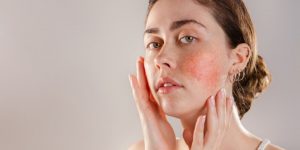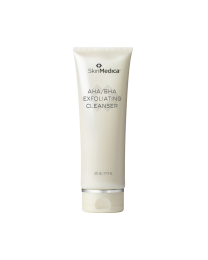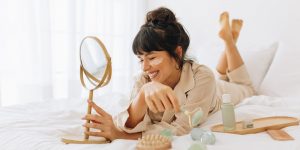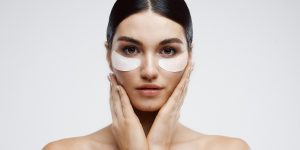Free Shipping Over $100
Free Samples With Every Purchase
Auto Replenishment Available
Authorized Reseller
Best Skincare for Rosacea: Cleansers, Cosmetics & Tips
For many people, choosing the right skincare product is as simple as understanding their skin type and finding options designed to address these specific needs. That doesn’t mean there are no difficulties in choosing the right products, but there are plentiful options that are marketed directly toward them. Unfortunately, those who have rosacea-prone skin do not have the same luxury. Even products that claim to be made for sensitive skin may not be ideal. There are a few skincare products available that have been specifically designed and formulated with rosacea-prone skin in mind, but these are few and far between. In this blog, we provide information about some of our dermatologists’ favorite products for rosacea-prone skin and highlight some products to look for and others you should skip if you have rosacea-prone skin. Even though these skincare products have been dermatologist-recommended, everyone is different, and we all have unique skincare needs. The best way to develop an effective skincare plan is to work directly with a dermatologist who will make skincare product recommendations specific to your skin health needs and goals. Our rosacea-prone skincare routine recommendations offer a good place to start.
Understanding Rosacea-Prone Skin
Rosacea is a common, chronic skin condition that causes a range of symptoms, but the most common is skin redness or flushing on the face. In addition to the common skin redness and flushing, other rosacea symptoms include:
- Noticeably visible blood vessels
- Skin thickening or bumps
- Eye irritation
- Burning, stinging, or excessively dry skin
- Swelling and inflammation
There is no one cause of rosacea, but it is often developed by those who have pale skin or whose family members have rosacea. Thus, it’s believed there may be a genetic component. While it’s more common for people with these risk factors, anyone of any age, gender, or skin tone can develop rosacea. While most people think of the traditional type of rosacea (erthematotelangiectatic rosacea) that causes the pink or red flushing of skin on the cheeks and forehead, there are actually four common types with unique symptoms. Papulopustular rosacea causes acne-like breakouts and inflammation. Phymatous rosacea causes thick, bumpy skin patches, and ocular rosacea impacts the eyes, leading to irritation, redness, and inflammation in and around the eye.
Self-Care Tips for Managing Rosacea
For most, managing rosacea begins with learning their rosacea triggers. Each person will have a unique set of irritants that will trigger a flare-up in the condition. By learning rosacea triggers, individuals can limit exposure and diminish the number and severity of flare-ups. To learn triggers, track your symptoms along with the temperature, humidity, activities, foods, cleansers, and skincare products used. Over time, you will start to see patterns. If you notice a flare-up when you use a certain product, wear a specific fabric, or during certain times of the year, you can take steps to avoid triggers or offset the adverse skin reactions.
In addition to learning triggers, it’s important to minimize the number of skincare products and cosmetics used. Those who have rosacea-prone skin should also take care before introducing skincare products. Before using a new product on your full face or large portions of the body, test the product on a small area. The skin of the neck below the chin is not immediately noticeable, so it’s a good option to test new products that may cause flare-ups. In addition to streamlining the skincare routine and testing products, it’s important to be aware of skincare ingredients that commonly trigger rosacea flare-ups, including:
- Alcohol
- Fragrance
- Exfoliants
- Eucalyptus
- Mint
- Menthol
- Witch hazel
- Dyes
The Importance of Cleansing with Dermatologist-Recommended Cleansers
Choosing skincare products with care is important for those with rosacea-prone skin, but the right cleanser is essential. While irritating or abrasive cleansers can trigger a rosacea flare-up, failing to keep skin clean can also lead to a rosacea flare-up. The key is to utilize a gentle cleanser that is right for your skin type in addition to being safe for those with rosacea-prone skin. One of the recommendations dermatologists often make for rosacea-prone skin is to use a soap-free cleanser. That may sound counterintuitive, but non-soap cleansing products can still thoroughly clean skin. However, they are less likely to irritate the skin and trigger a rosacea flare-up. Soap-based cleansers are made of fats, oils, or fatty acids. Non-soap cleansers utilize gentler, synthetic ingredients to cleanse skin with less risk for irritation and rosacea flare-ups. Working with a dermatologist, you can find the ideal cleanser. Some of our top recommendations for the best face wash for rosacea sufferers include:
- EltaMD Foaming Facial Cleanser – Using pineapple enzymes, this gentle cleanser lifts away dirt, oil, and grime, minimizing irritation and ensuring a complete clean with no soap scum left behind.
- ZO Skin Health Hydrating Crème – Restores hydration, calms irritated skin, and soothes the appearance of visible redness. With continued use, skin will feel smoother, more hydrated, and less red.
- SkinMedica AHA/BHA Exfoliating Cleanser – This is another gentle, exfoliating facial wash that contains a unique formulation designed to improve the appearance and texture of skin.
Other Recommended Products for Rosacea-Prone Skin
While the right cleanser is an essential element for any skincare routine, it’s not the only element. In addition to cleansers, our dermatologists have curated a list of products to complete your morning and evening rosacea skincare routine:
Rosacea-Prone Skin Morning Routine
- EltaMD Foaming Facial Cleanser
- Skinbetter Science Alto Defense Serum – This gentle serum packs a potent blend of antioxidants to protect skin from pollutants, UVA/UVB rays, and other environmental aggressors.
- SkinCeuticals Phyto Corrective Gel - A calming, hydrating gel serum with botanical ingredients ideal to soothe and hydrate skin while improving visual redness.
- Revision Skincare Teamine Eye Complex – This soothing eye cream helps to minimize dark circles, reduce puffiness, and smooth out fine lines and wrinkles.
- ZO Skin Health Hydrating Crème – Excellent for extremely dry skin, irritation, and inflammation.
- SkinCeuticals Physical Fusion UV Defense SPF 50 – A 100% mineral sunscreen that offers broad-spectrum protection against sun damage.
Rosacea-Prone Skin Evening Routine
- SkinMedica AHA/BHA Exfoliating Cleanser
- Revision Skincare Retinol Complete – Retinols are often abrasive and irritating to the skin, making it difficult for those with rosacea-prone skin to find one that works for them. The Revision Skincare Retinol Complete serum utilizes a time-released retinol and soothing botanicals to diminish potential irritation and rosacea flare-ups.
- Revision Skincare DEJ Eye Cream – A gentle, intense hydrating cream for the sensitive skin around the eyes.
- EltaMD PM Therapy Facial Moisturizer – A luxuriously formulated overnight moisturizing cream that provides high-quality hydration with a gentle formulation that’s safe and effective for rosacea-prone skin.
Key Considerations for Choosing Cosmetics
While makeup and cosmetics can contain harsh ingredients that irritate rosacea-prone skin, that doesn’t mean you have to skip your makeup routine altogether. You just have to be a little more cautious about the types of products you’re using. Some recommendations for cosmetic usage supported by the National Rosacea Society include:
- Start with cleansing – For those with rosacea-prone skin, it’s essential to choose the right cleanser and use it correctly. Gently cleanse your skin and apply moisturizer before using any cosmetics.
- Less is more – Try to limit the number and types of cosmetic products you use. Too many makeup products mean a greater risk for rosacea flare-ups. Try to use fewer items and find products that serve multiple purposes. For example, green-tinted products help to offset skin redness. A green-tinted primer can create an even surface for makeup application and provide color correction.
- Go oil-free – Choose foundations and concealers that are oil-free. Oil-based cosmetics may be more easily absorbed into pores, leading to an increased risk for rosacea flares.
- Consider mineral products – Many people like cream-based products, but for those who struggle with rosacea, these types of makeup can leave rosacea-prone skin looking and feeling cakey. Mineral cosmetic products don’t tend to have ingredients that are irritating to the skin, and they sit on top of the skin without looking cakey.
- Take care of the eyes – The sensitive skin around the eyes should always be treated with care. For those with rosacea-prone skin, especially ocular rosacea, it’s important to use fewer cosmetic products around the eyes and ensure they have gentle ingredients.
Explore More Skincare Products
Are you interested in exploring more rosacea-friendly skincare products? You can check out our rosacea-prone skin products page. Want to explore more dermatologist-recommended and clinically-supported skincare products? Derm Skincare offers products hand-selected by knowledgeable dermatologists who understand the skin health needs of people with all skin types. You can also come back regularly to read our blog where we discuss a range of skin health topics and provide product recommendations to meet a diverse variety of skincare needs.

















